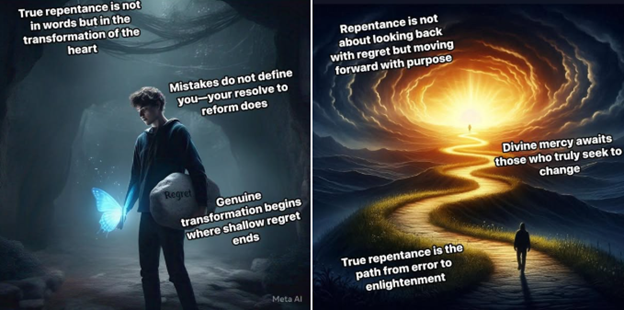
Kavi had long observed that in his community, many individuals approached their missteps and transgressions with a fleeting sense of remorse—expressions of regret that quickly faded as they slipped back into old habits. The true repentance is not merely an admission of fault but a complete turning of the heart—a profound, heartfelt commitment to change one’s ways and return to a path of righteousness.
The Repentance Pattern
Kavi noted two distinct responses to wrongdoing:
Superficial Regret: Many would utter apologies and offer half-hearted regrets, only to resume their misdeeds with little real change. This shallow form of repentance left the cycle of error unbroken and the individual spiritually stagnant.
Genuine Transformation: In contrast, a few committed individuals embraced sincere repentance. They not only acknowledged their faults but also made a concerted effort to overhaul their behavior. Their remorse was deep, their commitment to reform unwavering, and their lives gradually transformed by the cleansing power of true repentance.
The Quran beautifully encapsulates this principle, urging believers, “Say, ‘O My servants who have transgressed against themselves [by sinning], do not despair of the mercy of God'” (39:53). For Kavi, this verse served as a beacon of hope—a reminder that sincere repentance invites divine mercy and leads to lasting renewal.
The Framework for Sincere Repentance
Determined to guide his community toward authentic transformation, Kavi proposed a practical framework:
Acknowledge Your Mistakes:
Confront your errors head-on. Accept full responsibility for your actions without shifting blame, as true growth begins with honest self-reflection.
Feel Genuine Regret:
Let your remorse be deep and heartfelt. Recognize the harm caused by your actions, not only to yourself but also to those around you.
Commit to Change:
Resolve to alter your behavior. Establish clear steps and set concrete goals that will lead you away from your past misdeeds and toward a more righteous path.
Seek Forgiveness:
Approach God with humility. Sincerely ask for forgiveness, trusting in the promise of divine mercy, and work to make amends where possible.
Embrace Divine Mercy:
God’s compassion knows no bounds. Let this assurance strengthen your resolve to grow, knowing that every sincere effort toward betterment is met with divine grace and support.
The Lasting Impact
Kavi’s teachings on sincere repentance resonated deeply within his community. As individuals began to internalize this framework, they discovered that mistakes were not the end but a gateway to spiritual renewal. By turning their missteps into opportunities for growth, they forged a path toward inner peace and lasting transformation.
As the community embraced sincere repentance, they witnessed a gradual but profound shift—a move away from the cyclical patterns of error and shallow regret toward a collective journey of self-improvement, forgiveness, and divine mercy. Kavi’s insights thus illuminated a timeless truth: the true measure of a person is not defined by past failures, but by the courage and sincerity with which they strive to reform and renew their spirit.

